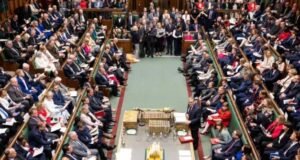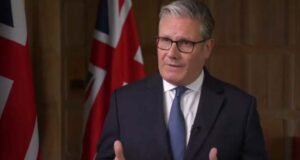The United Kingdom values its relationship with Bangladesh deeply. The 440,000-plus people of Bangladeshi origin in the UK make an enormous contribution to British society. That is why the Government will continue to work closely with Bangladesh on its democratic path and as it grows to be a strong and more prosperous nation that benefits all its people said UK’s Minister of State for Foreign & Commonwealth Office Hugo Swire who was responding to members of UK Parliament at a debate titled ‘Bangladesh and its future’ held on Wednesday, 17 June at the House of Commons Chamber. The debate was put forwarded by Anne Main MP and chaired by Sir Alan Meale MP.
Anne Main MP in her introduction to the debate said, ‘That this House has considered Bangladesh and its future. This debate about the future and direction of travel of Bangladesh is important, and I am delighted that it is well attended by people from the all-party group on Bangladesh.’
It is worth briefly revisiting how and why Bangladesh was born, and why it emerged from the cauldron that was East Pakistan…and against the prospect of greater Islamisation—to become the modern developing country that it is today. She reminded participating MPs at the debate of the dreams and ideals for Bangladesh when Sheikh Mujibur Rahman led his people to victory in the battle for independence. Sheikh Mujibur Rahman led the call to arms to fight for independence in his country in his Road to Ramna speech on 7 March 1971. Anne Main MP stated part of that famous speech, “I am requesting you, you are my brothers. Do not make this country a hell and destroy it. We will not see each other’s face in the future. If we can solve things in a peaceful manner, we can at least live as brothers. That is why I am requesting you; do not try and run military rule in my country… Hindus, Muslims, Bangalis and non-Bangalis, all those who live in this Bangla are our brothers. The responsibility of protecting them is upon you. Ensure that our reputation is not smeared in any way… If one more shot is fired and if my people are killed again then my request to you is; build a fortress in each and every home. Face the enemy with whatever you have” and added even then, in the call to arms, he was stating how relevant it would be in an independent country to be secular and inclusive. It was also the vital struggle for secularism and the wish to live in peace with their fellows.
Anne Main expressed her concerns over malicious destabilisation of the country through acts of violence by groups that do not hold the high ideals that Mujibur Rahman expressed in 1971. She said no avenues must be left unexplored in supporting Bangladesh’s avowed commitment to secularism, its avowed commitment to ensuring a fair and transparent electoral process, and, most importantly, its role in protecting the rights of religious minorities. She also mentioned that, in October 2010, the High Court in Bangladesh declared, “Bangladesh is now a secular state… everybody has religious freedom…”
She reported worrying attacks on individual bloggers in Bangladesh. She said four bloggers have been brutally murdered since February 2014. In February of that year, Ahmed Rajib Haider was killed outside his home amid tensions over a tribunal judging war crimes. In February 2015, a Bangladesh-born American blogger, Avijit Roy, was similarly killed with machetes and knives as he walked back from a book fair in Dhaka. In March 2015, Washiqur Rahman, 27, was hacked to death by two men with knives and meat cleavers just outside his house as he headed to work in Dhaka. In May, Ananta Bijoy Das, 32, was killed as he left his home on his way to work at a bank. Four masked men hacked him to death with cleavers. Such atrocities have been linked to freedom of speech and perceived religious insults.
Anne Main MP mentioned that on Monday, Sheikh Hasina addressed Members at an event in the Commonwealth Parliamentary Association room where she was warmly welcomed. Sheikh Hasina made a point of reaffirming Bangladesh’s commitment to upholding secularism and tackling terrorism.
Anne Main mentioned of her visits to Bangladesh, the most recent visit being in 2013 as chair of the all-party parliamentary group on Bangladesh with Members in the Chamber who went on a cross-party visit to investigate and report on the Rana Plaza tragedy
She concluded by stating, ‘We are friends of Bangladesh, but we are critical friends. It is vital that we, as the biggest bilateral donors to Bangladesh, act as a critical friend and offer help and support where we can. We need to ensure that aid money is being well used and well targeted. It would help to satisfy many critics of our aid budget if they knew that the money is helping to form, mould and support a country that is independent, secular and a bulwark against the fundamentalist Islamism.
In the debate Conservative MP Mark Field raised the issue of religious minorities in Bangladesh. He said, ‘I am afraid that has deteriorated in tandem with the rapid rise of militant Islam and its influence on Bangladeshi politics. I take this opportunity to raise the plight of the 20 million Hindus, Buddhists, Christians and indigenous minorities living in Bangladesh. Since the verdict by the International Crimes Tribunal in February 2013, which handed a life sentence to the leading Jamaat-e-Islami figure for war crimes in 1971, members of Jamaat have responded by destroying many places of worship, and murdering and attacking innocent people for their religious views, as has been pointed out.’ Anne Main briefly responded by saying that though she has no proof, Jamaat is actively funded by Islamists in Pakistan, to help fund their destruction of Bangladesh.
Labour’s Jim Fitzpatrick MP who has been most vocal against the presence of Jamaat-e-Islami and its front organisation Islamic Forum Europe in the UK and especially in London borough of Tower Hamlets where most Bengalis reside said the Islamic Forum of Europe has a bad influence on our young people in the UK. On Bangladesh’s Prime Minister’s trip to London he said, ‘It was great to see Sheikh Hasina here this week giving commitments on the drive to rebuild confidence in the electoral process and institutions. Incidentally, it was also great to see her niece, my hon. Friend the Member for Hampstead and Kilburn Tulip Siddiq, make her impressive maiden speech yesterday. She will be a real asset to not only the Labour party, but the whole House in due course. The Prime Minister of Bangladesh is rightly proud of her.
He added as parliamentarians, we have great respect in Bangladesh. This debate will, I know, be covered in Dhaka’s Daily Star. It will also feature on Bangladesh TV here in the UK and back in Dhaka and Sylhet. The message we collectively want to send to the Bangladesh Government is, “We are your friends. We are here to help. We want to do everything we can to see continued progress in your country, which has made fantastic progress in the last 40-odd years.”
Labour MP Kerry McCarthy expressed her serious concern about the persecution of Hindu communities and the decline of the Hindu population in Bangladesh including the three secular bloggers who were hacked to death. She demanded that those responsible for such horrendous acts must be brought to justice, and the Government must protect the rights of religious minorities and atheists in Bangladesh, as well as the majority Muslim population. She also expressed her horror in the discovery of mass graves and scenes of migrants from Burma and Bangladesh packed on board ships and risking their lives in search of a new home in Malaysia, Thailand or Indonesia.
The Minister of State, Foreign and Commonwealth Office Hugo Swire responded by praising Anne Main MP on securing the debate and on the almost universal acclaim from all parts of the House for her work as chair of the all-party group on Bangladesh.
He reminded that in January 2014 the House had a debate on Bangladesh immediately after its 10th parliamentary elections. Those taking part in that debate expressed concerns about the high levels of violence and disruption, the removal from Bangladesh’s constitution of the provision for a caretaker Government, following the annulment of that provision by the Supreme Court and the consequent lack of participation by some of Bangladesh’s political parties in the elections.
While that was deeply disappointing, the UK recognised that elections had been held, in accordance with Bangladesh’s constitution, which was amended by its Parliament in 2011. While it is not for the UK to prescribe the constitutional provisions of other countries.
The recent horrifying and brutal murders of three bloggers in Bangladesh caused consternation around the world. The perpetrators must be brought to justice and the Bangladeshi Government must be unequivocal in protecting those who speak up
On the final verdict in the Supreme Court of Bangladesh’s appellate division, confirming the death sentence against Jamaat secretary-general Ali Ahsan Mohammad Mujahid, for crimes committed during the 1971 liberation war he said while he understands the strong desire finally to bring those who committed terrible atrocities to account, the UK remains strongly opposed to use of the death penalty in any circumstances.
On the the devastating collapse of Rana Plaza he welcomed the all-party group’s report and recommendations. He added that the garment industry in Bangladesh has played a pivotal role in Bangladesh’s development by helping to reduce poverty and empower women. Significant steps have been taken to improve building safety and working conditions, but there is still more to be done. The UK is providing £7.4 million to fund factory inspections, train new inspectors, strengthen factory health and safety, help garment workers to understand their rights and help survivors of Rana Plaza to find new jobs or start their own businesses.
He concluded on Indian Prime Minister Modi’s recent visit to Bangladesh, ‘It is important that countries in the region collaborate to ensure the region’s long-term stability and prosperity. We therefore welcome the Indian Parliament’s long overdue ratification of the 1974 India-Bangladesh land boundary agreement and the 2011 protocol. That will make a significant difference to the lives of tens of thousands of citizens living in enclaves on either side of the border. We hope that this historic agreement, along with other Bangladesh-India bilateral agreements made during Mr Modi’s visit, paves the way for even more—for example, on Teesta water sharing.
It is important that all countries in south Asia continue to play a role in tackling the threats of terrorism, extremism and radicalisation. I therefore welcome Prime Minister Sheikh Hasina’s commitment to eradicating terrorism.’
Other members who took part in the debate were Labour Party MPs Jonathan Reynolds, Christian Matheson, Christina Rees, Jonathan Reynolds, Conservative MP Paul Scully, Scottish National Party’s Tasmina Ahmed Sheikh and Ms Ahmed Sheikh.
 Weekly Bangla Mirror | Bangla Mirror, Bangladeshi news in UK, bangla mirror news
Weekly Bangla Mirror | Bangla Mirror, Bangladeshi news in UK, bangla mirror news








